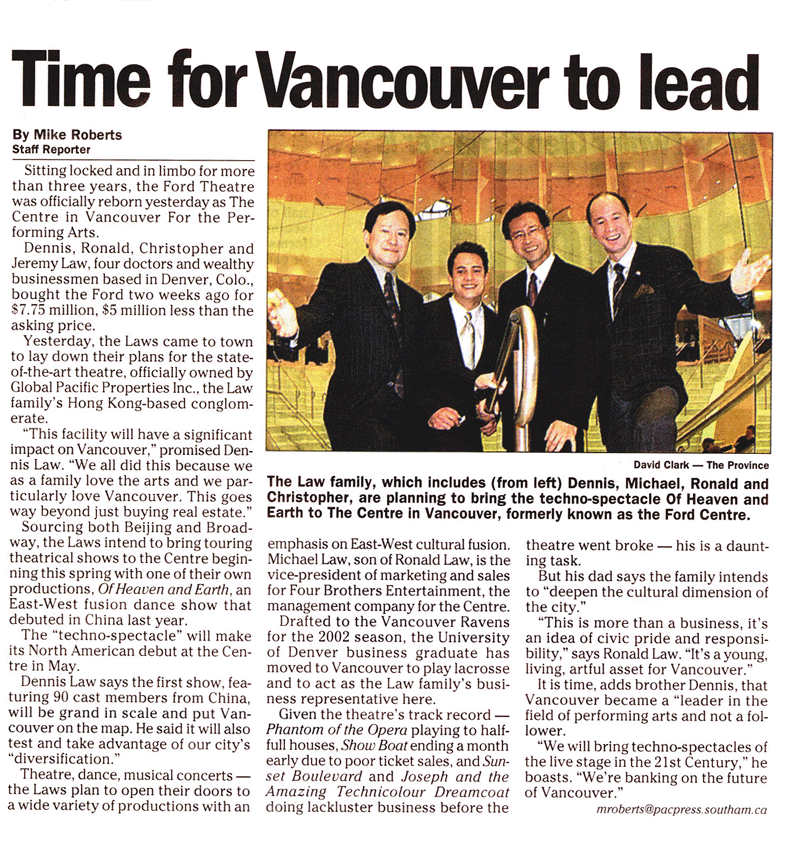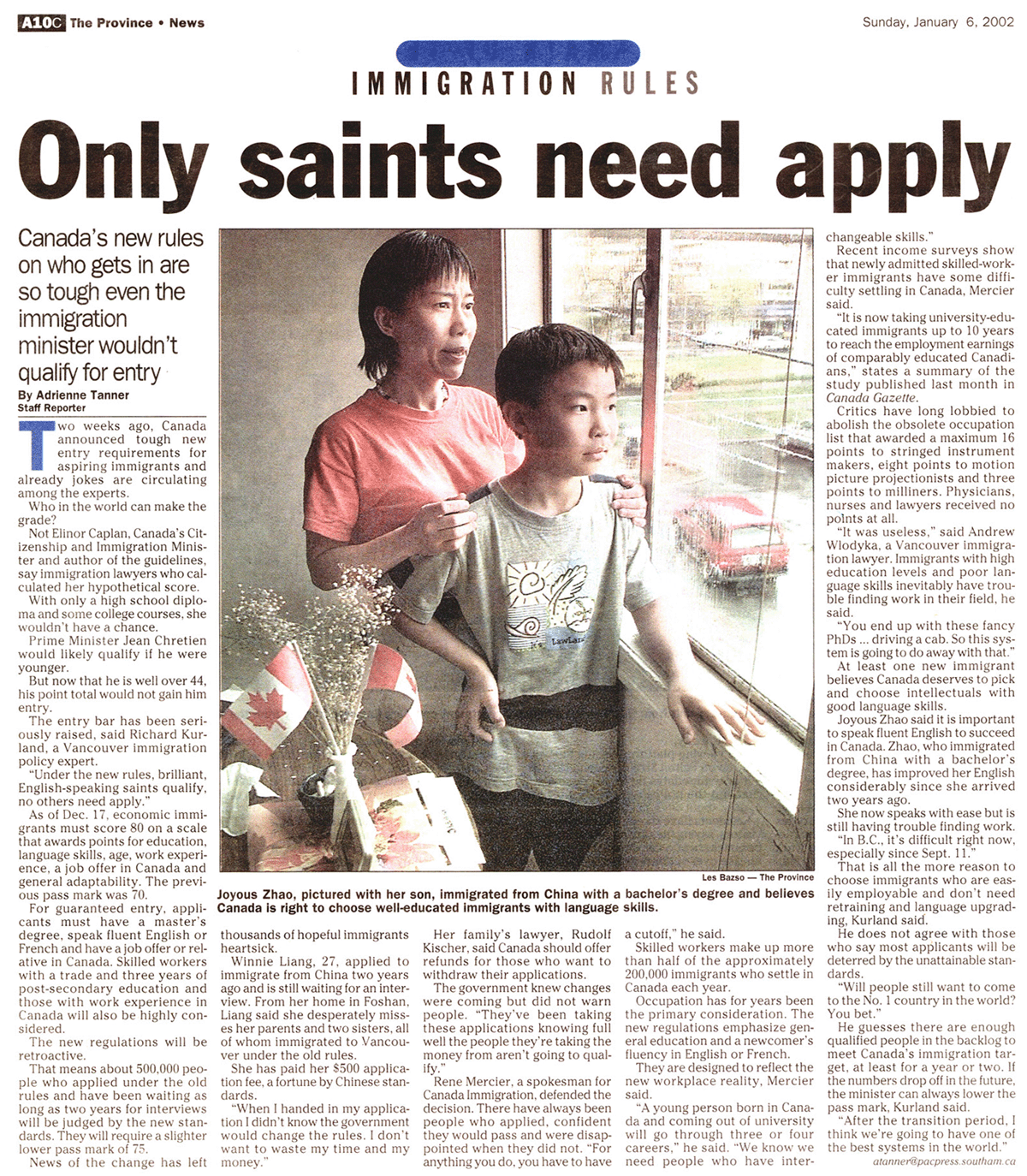Sun

Sun

Ashley Ford
Sun

Graphic shows the expanded terminal and location of cruise ships
When the largest cruise liner to operate on the West Coast makes its first visit to Vancouver on May 11, her 2,600 passengers will disembark into the finest cruise ship terminal in North America.
The $79-million cruise ship terminal expansion at Canada Place will be completed and open for business a year ahead of schedule.
“We are 90-per-cent complete, on budget and will be ready for the beginning of the Alaska cruise season,” Peter Xotta, senior manager for business development at the Vancouver Port Authority, said yesterday.
“We feel it is the premier facility of its type in North America.”
Xotta said the work was completed ahead of schedule because of good weather and few problems in the pile driving and deck expansion.
“You never really know when working with water but it went much better than expected,” he said.
The expansion adds a third berth and is large enough to allow marine behemoths such as the 109,000-ton Star Princess – which is too big to transit the Panama Canal – to easily dock on the east side. Xotta says the terminal can handle the largest cruise ships afloat.
Star Princess is a magnificent beast. It is 951 feet long, has 18 deck levels and can cruise at 22 knots. It has a nine-hole putting green, four pools, nine whirlpool spas, three dining rooms, 17 bars, three show lounges and a casino.
The terminal will help cement the city’s position as the pre-eminent port serving the Alaska cruise trade.
The Star Princess alone will generate an estimated 50,440 passengers. Each cruise ship arrival pumps more than $1 million into the local economy. Star Princess and 20 other ships will be based here.
The terminal has been designed to ensure the estimated one-million-plus cruise ship passengers each year can move through as effortlessly as possible. There are expanded facilities for baggage, passengers, bus staging and all in a very secure environment.
Some 52,000 square feet of space on an entertainment-promenade level atop the terminal will eventually house restaurants, educational attractions, sports and other recreational activities.
On the cruise-ship level there is 17,000 square feet of space for other retail or – commercial use. A substantial out door promenade area has been created at the northern tip of the terminal for public use.
Doug LePatourel, of Colliers International, retained to lease the space known as The Pointe at Canada Place, says the goal is to attract a major entertainment enterprise to complement the existing Imax theatre.
Michael Smyth
Province

FRED BASS ‘grossly wrong’
The crusade by the Workers Compensation Board to ban smoking in all B.C. pubs and restaurants will finally grind to a halt today.
The government will snuff out the WCB plan once and for all at a public cabinet meeting in Fort St. John, sources told The Province.
The WCB ban was originally scheduled for implementation last September but
was delayed while the province reviewed the issue.
In its place, the Liberals will introduce a “compromise” policy, allowing restaurant and pub owners to set up smoking areas in
their establishments as long as the area is fitted with a ventilation system to suck out smoke.
Ventilation must be designed to protect pub and restaurant workers from second-hand smoke, even though anti-smoking groups say no one has invented a system that can do that. To address those concerns, the government is expected to bring in a new rule: Workers will be given the right to refuse to enter the smoking area.
Sources say the government will allow up to 45 per cent of the total area of a pub or restaurant to be designated for smoking. And it will decree that workers can spend no more than 20 per cent of their working time in the smoking room.
Municipalities will still have the right to establish their own smoking bans within their own boundaries.
The plan will be presented as a compromise between factions that wanted a total smoking ban [mainly public health advocates and the WCB] and those who wanted wide-open smoking [mainly pub and restaurant owners].
It’s no coincidence the government has selected Fort St. John to make the announcement: It’s bound to be popular in the north, where smokers didn’t want to be forced outside to light up in sub-zero temperatures.
But employers will be faced with the cost of installing ventilation systems and changing their floor plans.
Heather MacKenzie, president of Airspace Action on Smoking and Health, called the new rules “sickening,” adding: “Workers are being poisoned by second-hand smoke. Tobacco smoke causes fatal lung disease in non-smokers.” Said Vancouver Councilor Fred Bass, co-chairman of the B.C. Medical Association’s tobacco and illness committee: “There’s no scientific evidence or industrial standard that ventilation will get rid of the risk of spond-hand smoke. This decision is grossly wrong.”
Pharmacist Bev Harris, health advocate for the Clean Air Coalition, said secondhand smoke is “a known carcinogen … it causes cancer.”
And she said overriding the WCB is “a dangerous, precedent-setting move.”
A complaint filed last fall over Labour Minister Graham Bruce’s decision to delay imposing the WCB ban is being investigated by the B.C. Human Rights Commission, said MacKenzie.
• Sources also say the government is about to announce it will allow beer-and-wine stores to sell hard liquor, beginning with about 20 outlets across B.C.
Ashley Ford
Sun
B.C.’s beleaguered tourism industry could take another $400million-revenue hit this year as the global travel fallout from Sept. 11 continues.
That will come on top of the expected drop of $800 million in revenue for 2001, Rod Harris, president and chief executive of Tourism B.C. told The Province in an interview from Victoria yesterday.
“These are all very preliminary estimates,” Harris said, but he acknowledged the industry is in for a very bruising year.
“This is all new territory for us and is the first time we have ever seen this,” said Harris.
Tourism has been one of the few constant growing sectors in the B.C. economy for more than a decade. Tourism B.C.’s latest projections show revenues falling for 2001 (the official year-end is March), from $9.5 billion to $8.7 billion.
Harris now expects another five per-cent revenue drop in 2002 which would bring revenues to around the $8-billion level, a massive total $1.2-billion revenue tumble in just two years.
But he remains upbeat. He said this year could work out better than anyone currently anticipates.
For instance, he said, it is just too early to predict how the key U.S. visitor market will respond. “We just don’t know at this point in time.”
Tourism Vancouver has the same outlook- projecting a drop of between nine per cent to 14 per cent in visitors this year.
It originally projected 8.8 million overnight visitors for 2002 and has now dropped that to 7.6 million to 8.1 million. That will result in a drop in direct spending of over $200 million.
Walt Judas, spokesman for Tourism Vancouver, said it projects there were 8.1 million overnight visitors last year, down from the predicted 8.6 million. He also stressed the numbers are very preliminary.
“Now we are projecting 7.6 million to eight million overnight visitors for 2002,” Judas said.
It’s difficult to gauge the possible job impact, Harris said. The industry is one of the largest employers in B.C.’s economy and employs 115,000 directly.
But when you factor in indirect and tourism-dependent jobs the number rises to 235,000, he said.
“We simply have no data yet on how the situation might affect jobs,” he said.
Sun

Province

Les Twarog Vancouver Real Estate and Condo Blog is proudly powered by
WordPress
Entries (RSS)
and Comments (RSS).
Articles are from various sources and courtesy to The Vancouver Sun, The Vancouver Province, The Vancouver Courier, USA Today, and others.
Bad Behavior has blocked 1461 access attempts in the last 7 days.